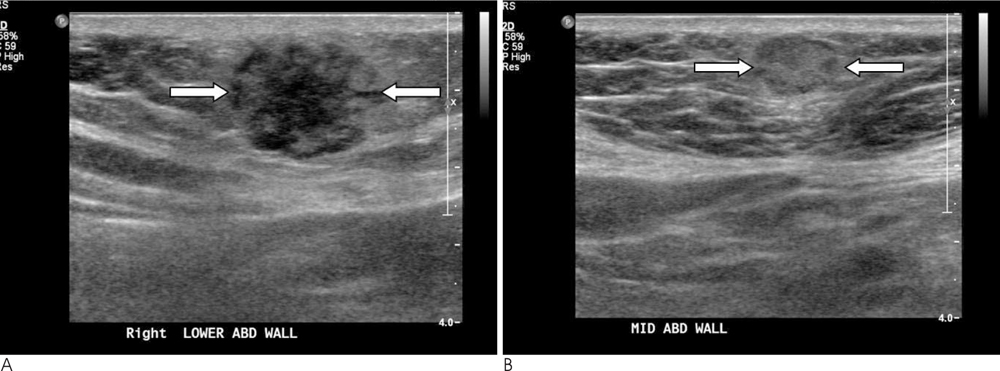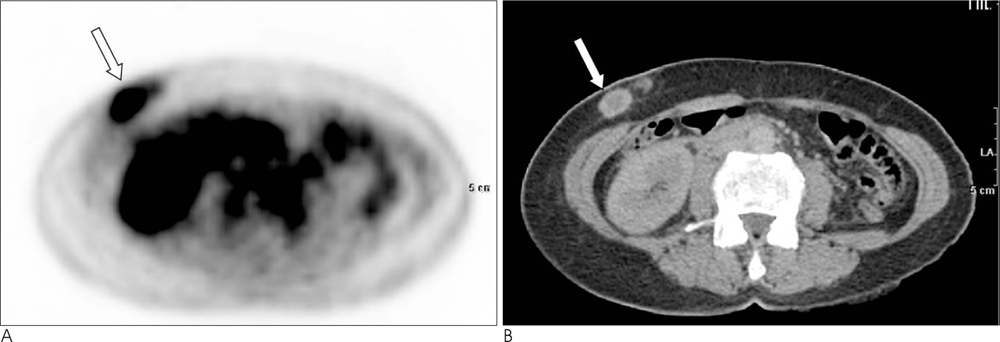J Korean Soc Radiol.
2011 Jun;64(6):611-614. 10.3348/jksr.2011.64.6.611.
Abdominal Wall Metastasis from an Invasive Lobular Carcinoma of the Breast: A Case Report
- Affiliations
-
- 1Department of Radiology, Gangnam Severance Hospital, Yonsei University College of Medicine, Korea. ejsonrd@yuhs.ac
- 2Department of Diagnostic Pathology, Gangnam Severance Hospital, Yonsei University College of Medicine, Korea.
- KMID: 1443513
- DOI: http://doi.org/10.3348/jksr.2011.64.6.611
Abstract
- Breast cancer is one of the most common malignancies in women. Breast cancer frequently metastasizes to the bones, lungs, and liver. However, the recurrence of distant soft-tissue metastasis except to the chest wall is extremely rare. Here, we describe our experience with a patient in whom invasive lobular carcinoma of the breast with metastasis to the abdominal wall presented as subcutaneous nodules without local recurrence.
MeSH Terms
Figure
Reference
-
1. Sastre-Garau X, Jouve M, Asselain B, Vincent-Salomon A, Beuzeboc P, Dorval T, et al. Infiltrating lobular carcinoma of the breast: clinicopathologic analysis of 975 cases with reference to data on conservative therapy and metastatic patterns. Cancer. 1996; 77:113–120.2. Winston CB, Hadar O, Teitcher JB, Caravelli JF, Sklarin NT, Panicek DM, et al. Metastatic lobular carcinoma of the breast: patterns of spread in the chest, abdomen, and pelvis on CT. AJR Am J Roentgenol. 2000; 175:795–800.3. Harris M, Howell A, Chrissohou M, Swindell RI, Hudson M, Sellwood RA. A comparison of the metastatic pattern of infiltrating lobular carcinoma and infiltrating duct carcinoma of the breast. Br J Cancer. 1984; 50:23–30.4. Borst MJ, Ingold JA. Metastatic patterns of invasive lobular versus invasive ductal carcinoma of the breast. Surgery. 1993; 114:637–641.5. Lamovec J, Bracko M. Metastatic pattern of infiltrating lobular carcinoma of the breast: an autopsy study. J Surg Oncol. 1991; 48:28–33.6. Kidney DD, Cohen AJ, Butler J. Abdominal metastases of infiltrating lobular breast carcinoma: CT and fluoroscopic imaging findings. Abdom Imaging. 1997; 22:156–159.7. El Khoury M, Cherel P, Becette V, De Maulmont C, Costes V, Talma V, et al. Unusual soft-tissue metastasis of an invasive lobular carcinoma mimicking fasciitis. AJR Am J Roentgenol. 2004; 182:745–747.8. Rasbridge SA, Gillett CE, Sampson SA, Walsh FS, Millis RR. Epithelial (E-) and placental (P-) cadherin cell adhesion molecule expression in breast carcinoma. J Pathol. 1993; 169:245–250.9. Van Aken E, De Wever O, Correia da Rocha AS, Mareel M. Defective E-cadherin/catenin complexes in human cancer. Virchows Arch. 2001; 439:725–751.10. Ferlicot S, Vincent-Salomon A, Medioni J, Genin P, Rosty C, Sigal-Zafrani B, et al. Wide metastatic spreading in infiltrating lobular carcinoma of the breast. Eur J Cancer. 2004; 40:336–341.
- Full Text Links
- Actions
-
Cited
- CITED
-
- Close
- Share
- Similar articles
-
- Nodular Metastatic Carcinoma from Invasive Lobular Breast Cancer
- Occult Invasive Lobular Carcinoma of Breast Detected by Stomach Metastasis: A Case Report
- Invasive Lobular Carcinoma of the Breast Associated with Mixed Lobular and Ductal Carcinoma In Situ: A Case Report
- Lobular carcinoma in situ in sclerosing adenosis
- Lobular Breast Carcinoma Metastasis to the Thyroid Gland: Case Report and Literature Review




